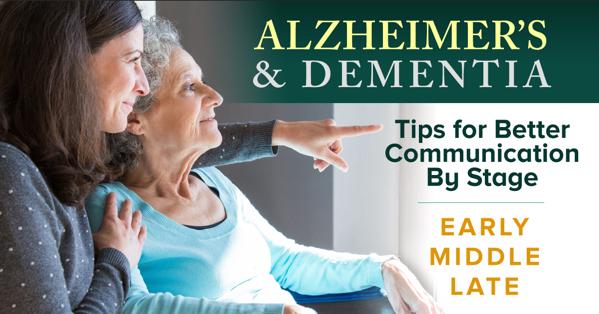Communicating with someone who has Alzheimer’s disease or a related dementia can be challenging.
“Alzheimer’s is a cruel disease. It robs people of so much – including the ability to clearly communicate and understand what friends and loved ones are saying,” said Sierra Goetz, co-founder and operations manager at Tudor Oaks Home Care’s partner, the HomeCare Advocacy Network (HCAN). “The inability to communicate can be frustrating for everyone, so it’s important to have patience, good listening skills and different strategies.”
The Alzheimer’s Association offers the following advice to aid communication in every stage of the disease.
Early Stage
- Don’t make assumptions about a person’s ability to communicate. The disease affects each person differently.
- Don’t exclude the person from conversations.
- Speak directly to the person rather than to a caregiver or companion.
- Take time to listen to the person express his/her thoughts, feelings and needs.
- Give the person time to respond – don’t interrupt unless help is requested.
- Ask what the person is comfortable doing and what he/she may need help with.
- Discuss which method of communication is most comfortable – for example, face-to-face conversation, email or phone calls.
- It’s okay to laugh – sometimes humor lightens the mood and makes communication easier.
- Don’t pull away – your honesty, friendship and support are important.
Middle Stage
- Engage the person in one-on-one conversations in a quiet space with minimal distractions.
- Speak slowly and clearly.
- Maintain eye contact. It shows you care about what he/she is saying.
- Give the person plenty of time to respond so he/she can think about what to say.
- Be patient and offer reassurance. It may encourage the person to explain his/her thoughts.
- Ask one question at a time.
- Ask yes or no questions. For example – “Would you like some coffee?” instead of “What would you like to drink?”
- Avoid criticizing or correcting.
- Avoid arguing. If the person says something you don’t agree with, just let it be.
- Offer clear, step-by-step instructions for tasks.
- Give visual cues. Demonstrate a task to encourage participation.
- Written notes can be helpful when spoke words are confusing.
Late Stage
- Approach the person from the front and identify yourself.
- Encourage nonverbal communication. If you don’t understand what the person is trying to say, ask him/her to point or gesture.
- Use touch, sight, sound, smell and taste as a form of communication with the person.
- Consider the feelings behinds words or sounds. Sometimes the emotions being expressed are more important than what’s being said,
- Treat the person with dignity and respect – avoid talking down to him/her.
- It’s okay if you don’t know what to say – your presence and friendship are most important,
For more information about Alzheimer’s disease and available support near you, call the Alzheimer’s Association 24/7 Help Line – 800.272.3900 or visit alz.org.
